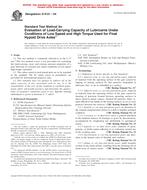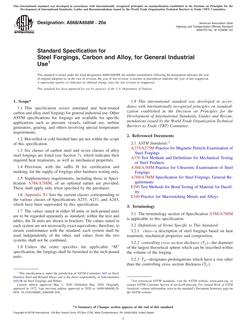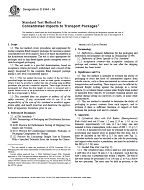1.1 This general requirements specification covers a group of common requirements that, unless otherwise specified in the applicable product specification, apply to rolled structural steel bars, plates, shapes, and sheet piling covered by each of the following product specifications issued by ASTM:
| ASTM Designation³ |
Title of Specification |
| A 36/A 36M | Carbon Structural Steel |
| A 131/A 131M | Structural Steel for Ships |
| A 242/A 242M | High-Strength Low-Alloy Structural Steel |
| A 283/A 283M | Low and Intermediate Tensile Strength Carbon Steel Plates |
| A 328/A 328M | Steel Sheet Piling |
| A 514/A 514M | High-Yield Strength, Quenched and Tempered Alloy Steel Plate Suitable for Welding |
| A 529/A 529M | High-Strength Carbon-Manganese Steel of Structural Quality |
| A 572/A 572M | High-Strength Low-Alloy Columbium-Vanadium Steel |
| A 573/A 573M | Structural Carbon Steel Plates of Improved Toughness |
| A 588/A 588M | High-Strength Low-Alloy Structural Steel with 50 ksi (345 MPa) Minimum Yield Point to 4 in. [100 mm] Thick |
| A 633/A 633M | Normalized High-Strength Low-Alloy Structural Steel Plates |
| A 656/A 656M | Hot-Rolled Structural Steel, High-Strength Low-Alloy Plate with Improved Formability |
| A 678/A 678M | Quenched-and-Tempered Carbon and High-Strength Low-Alloy Structural Steel Plates |
| A 690/A 690M | High-Strength Low-Alloy Steel H-Piles and Sheet Piling for Use in Marine Environments |
| A 709/A 709M | Carbon and High-Strength Low-Alloy Structural Steel Shapes, Plates, and Bars and Quenched-and-Tempered Alloy Structural Steel Plates for Bridges |
| A 710/A 710M | Age-Hardening Low-Carbon Nickel-Copper-Chromium-Mo- lybdenum-Columbium Alloy Structural Steel Plates |
| A 769/A 769M | Carbon and High-Strength Electric Resistance Welded Steel Structural Shapes |
| A 786/A 786M | Rolled Steel Floor Plates |
| A 808/A 808M | High-Strength Low-Alloy Carbon, Manganese, Columbium, Vanadium Steel of Structural Quality with Improved Notch Toughness |
| A 827/A 827M | Plates, Carbon Steel, for Forging and Similar Applications |
| A 829/A 829M | Plates, Alloy Steel, Structural Quality |
| A 830/A 830M | Plates, Carbon Steel, Structural Quality, Furnished to Chemical Composition Requirements |
| A 852/A 852M | Quenched and Tempered Low-Alloy Structural Steel Plate with 70 ksi [485 Mpa] Minimum Yield Strength to 4 in. [100 mm] Thick |
| A 857/A 857M | Steel Sheet Piling, Cold Formed, Light Gage |
| A 871/A 871M | High-Strength Low Alloy Structural Steel Plate with Atmospheric Corrosion Resistance |
| A 913/A 913M | Specification for High-Strength Low-Alloy Steel Shapes of Structural Quality, Produced by Quenching and Self-Tempering Process (QST) |
| A 945/A 945M | Specification for High-Strength Low-Alloy Structural Steel Plate with Low Carbon and Restricted Sulfur for Improved Weldability, Formability, and Toughness |
| A 950/A 950M | Specification for Fusion Bonded Epoxy-Coated Structural Steel H-Piles and Sheet Piling |
| A 992/A 992M | Specification for Steel for Structural Shapes for Use in Building Framing |
| A 1026 | Specification for Alloy Steel Structural Shapes for Use in Building Framing |
| A 1043/A 1043M | Specification for Structural Steel with Low Yield to Tensile Ratio for Use in Buildings |
1.2 Annex A1 lists permitted variations in dimensions and mass (Note 1) in SI units. The values listed are not exact conversions of the values in Tables 1 to 31 inclusive but are, instead, rounded or rationalized values. Conformance to Annex A1 is mandatory when the “M“ specification designation is used.
Note 1 – The term “weight“ is used when inch-pound units are the standard; however, under SI, the preferred term is “mass.“
1.3 Annex A2 lists the dimensions of some shape profiles.
1.4 Appendix X1 provides information on coil as a source of structural products.
1.5 Appendix X2 provides information on the variability of tensile properties in plates and structural shapes.
1.6 Appendix X3 provides information on weldability.
1.7 Appendix X4 provides information on cold bending of plates, including suggested minimum inside radii for cold bending.
1.8 This general requirements specification also covers a group of supplementary requirements that are applicable to several of the above product specifications as indicated therein. Such requirements are provided for use where additional testing or additional restrictions are required by the purchaser, and apply only where specified individually in the purchase order.
1.9 In case of any conflict in requirements, the requirements of the applicable product specification prevail over those of this general requirements specification.
1.10 Additional requirements that are specified in the purchase order and accepted by the supplier are permitted, provided that such requirements do not negate any of the requirements of this general requirements specification or the applicable product specification.
1.11 For purposes of determining conformance with this general requirements specification and the applicable product specification, values are to be rounded to the nearest unit in the right-hand place of figures used in expressing the limiting values in accordance with the rounding method of Practice E 29.
1.12 The values stated in either inch-pound units or SI units are to be regarded separately as standard. Within the text, the SI units are shown in brackets. The values stated in each system are not exact equivalents; therefore, each system is to be used independently of the other, without combining values in any way.
1.13 This general requirements specification and the applicable product specification are expressed in both inch-pound units and SI units; however, unless the order specifies the applicable “M“ specification designation (SI units), the structural product is furnished to inch-pound units.
1.14 The text of this general requirements specification contains notes and/or footnotes that provide explanatory material. Such notes and footnotes, excluding those in tables and figures, do not contain any mandatory requirements.
Product Details
- Published:
- 03/01/2007
- Number of Pages:
- 59
- File Size:
- 1 file , 420 KB
- Redline File Size:
- 2 files , 790 KB


